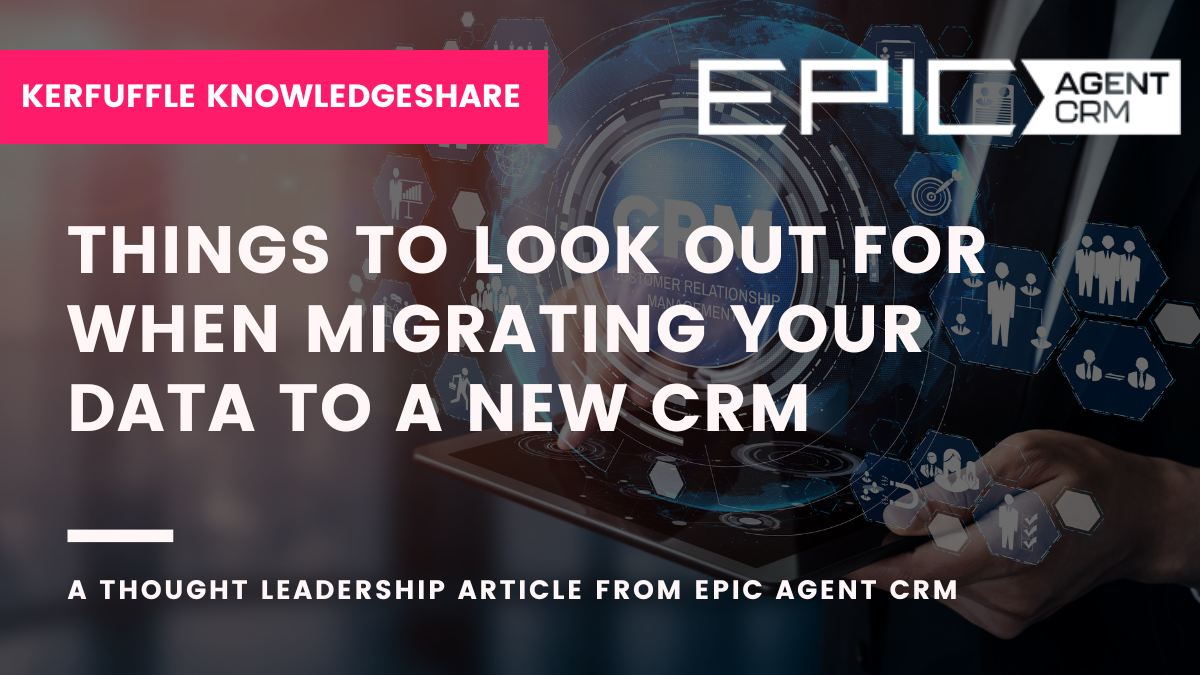THINGS TO LOOK OUT FOR WHEN MIGRATING YOUR DATA TO A NEW CRM
Things to look out for when migrating your data to a new Estate Agency CRM
Estate Agency CRM systems are essential tools for real estate professionals. These systems typically help agents manage their property listings, leads, transactions, and customer relationships. The migration of data from one real estate CRM system to another can be a sensitive task. In this article, we will explore the critical things to look out for when migrating your data to a new real estate CRM system.
- Evaluate your current data
Before migrating your data to a new CRM system, it is essential to evaluate your current data. The analysis includes identifying the type of data you have, the format, and the quality of the data. You must ensure that the data is accurate, complete, and up-to-date.
One of the best practices for evaluating your current data is to identify any duplicate or outdated records. This practice helps streamline the migration process and ensures that only relevant data is transferred to the new CRM system. Additionally, you may want to clean up your data before the migration process to ensure that the new CRM system is not bogged down with irrelevant data.
Another crucial consideration is to ensure that the new CRM system can accommodate all the types of data you currently have. For instance, if you have data in the form of spreadsheets, the new system should be able to import data from spreadsheets.
- Choose the right CRM system
Choosing the right CRM system is critical when migrating your data. There are many CRM systems available in the market, each with its strengths and weaknesses. Therefore, you need to choose a CRM system that is specifically designed for the real estate industry and has the features you need to manage your business effectively, rather than a generic CRM.
Some essential features to look out for include lead management, contact management, transaction management, and marketing automation. You also want to choose a system that is user-friendly and easy to customize. Consider the cost of the CRM system and whether it fits within your budget.
It is also essential to consider the scalability of the new CRM system. You want to choose a system that can grow with your business and can accommodate the increasing amount of data as your business grows.
- Plan the migration process
Planning is crucial when migrating your data to a new CRM system. Your new CRM supplier should guide you and take lead of this sensitive process. You need to develop a comprehensive plan that outlines the migration process, including the timeline, resources, and responsibilities. This plan should include steps for data mapping, data cleaning, data validation, and data transfer.
You should also develop a backup plan in case of any unforeseen issues that may arise during the migration process. The backup plan should include a contingency plan for data recovery, as well as a plan for communicating with clients and stakeholders during the migration process.
It is also essential to communicate the migration plan to your team, clients, and stakeholders. This communication helps manage expectations and ensures that everyone is aware of the process and any potential disruptions that may occur.
- Test the new CRM system
Before migrating your data to the new CRM system, it is essential to test the system thoroughly. This includes testing the system's functionality, user interface, and features. You should also test the data migration process to ensure that all data is transferred correctly and accurately.
Testing the new CRM system allows you to identify any issues or bugs before migrating your data, reducing the risk of data loss or corruption. You should involve your team in the testing process to ensure that the new system meets everyone's needs and is user-friendly.
It is also essential to consider the testing environment. You may your new CRM supplier to give you access to a testing environment that is identical to the production environment to ensure that the new CRM system will work correctly when deployed.
- Train your team
Once you have migrated your data to the new CRM system, it is essential to train your team on how to use the new system. This includes training on how to input and manage data, how to use the system's features, and how to generate reports.
Training your team on the new CRM system is critical to ensure that they can use it effectively and efficiently. This will help you to maximize the system's benefits and improve your overall business performance.
- Choose a supplier with previous data migration experience.
It is important that you choose a CRM provider that has ample previous experience running data migrations successfully from other systems. Do not shy away from asking about their experience and what measures they typically take to mitigate any risks. An experienced supplier will know the risks, have processes in place to mitigate the risks and should be able to guide you through the Real Estate CRM data migration process entirely.
- Consider data security
Data security is a critical consideration when migrating your data to a new CRM system. When migrating your data to a new real estate CRM system, data security should be a top priority. The transfer of data between systems can create vulnerabilities that cybercriminals can exploit to gain unauthorized access to sensitive information.
In this section, we will discuss some critical data security considerations when migrating your data to a new real estate CRM system.
Encryption
One of the most effective ways to protect your data during the migration process is to encrypt it. Encryption involves converting the data into a code that is unreadable without the correct decryption key. By encrypting your data, you can ensure that it remains secure during the transfer process and cannot be accessed by unauthorized parties.
You should ensure that the new CRM system supports encryption, both for data at rest and data in transit. Additionally, you should ensure that the encryption algorithms used by the new CRM system are up-to-date and secure.
Access Controls
Access controls are critical for protecting your data during the migration process. Access controls involve setting permissions and privileges for users who can access your data. You should ensure that only authorized personnel can access your data during the migration process.
You should also ensure that the new CRM system supports access controls and that you configure the system correctly to restrict access to sensitive data. You may want to consider implementing multi-factor authentication for added security.
Backup and Disaster Recovery
Data loss can occur during the migration process due to technical issues, cyber-attacks, or human error. Therefore, it is essential to have a backup and disaster recovery plan in place to ensure that you can recover your data if the migration process fails.
You should ensure that the new CRM system has a backup and disaster recovery plan in place. This plan should include regular backups of your data and a process for restoring the data if necessary.
Data Validation
Data validation is the process of checking data to ensure that it is complete, accurate, and consistent. Data validation is essential during the migration process to ensure that your data is not corrupted or lost during the transfer process.
You should ensure that the new CRM system has data validation features in place. The system should validate your data before and after the transfer process to ensure that it is complete and accurate.
Data Retention
Data retention policies are essential for ensuring that you retain data only for as long as necessary. Retaining data beyond its useful life can create unnecessary risk, as the longer the data is retained, the more likely it is to be compromised.
When migrating your data to a new CRM system, you should review your data retention policies and ensure that the new system supports your policies. The new system should allow you to set retention policies for different types of data and automatically delete data that is no longer needed.
Third-Party Integrations
Third-party integrations can create vulnerabilities during the migration process. You should review the third-party integrations that your new CRM system supports and ensure that they are secure and compliant with your data security policies.
You should also ensure that the new CRM system has a secure API for third-party integrations. The API should be designed to protect your data during the transfer process and provide access controls to ensure that only authorized parties can access your data.
Data security is a critical consideration when migrating your data to a new real estate CRM system. To ensure that your data is protected during the transfer process, you should ensure that the new CRM system supports encryption, access controls, backup and disaster recovery, data validation, data retention policies, and secure third-party integrations.
Additionally, you should ensure that your team is trained on the new CRM system's data security features and that you have a data security plan in place to address any potential data breaches. By following these best practices, you can ensure that your data remains secure during the migration process and beyond.
In conclusion, migrating data to a new real estate CRM system can be a challenging task, but it is necessary to ensure the growth and success of your real estate business. You should not shy away from migrating to a new system if it helps in your business growth, just because of the data migration process. To ensure a successful migration, there are several critical things to look out for, including evaluating your current data, choosing the right CRM system, planning the migration process, testing the new system, training your team, and monitoring and optimizing the system regularly. Additionally, it is crucial to consider data security during the migration process to protect your sensitive information from cyber threats.
Evaluating your current data helps ensure that only relevant and accurate information is transferred to the new system. Choosing the right CRM system that is designed specifically for the real estate industry and has the necessary features you need to manage your business is critical. Planning the migration process helps ensure a smooth transition, and testing the new system before the migration process helps identify and fix any issues or bugs.
Find out how EPIC Agent CRM can help your estate agency here: https://www.kerfuffle.com/suppliers/epic-agent-crm





